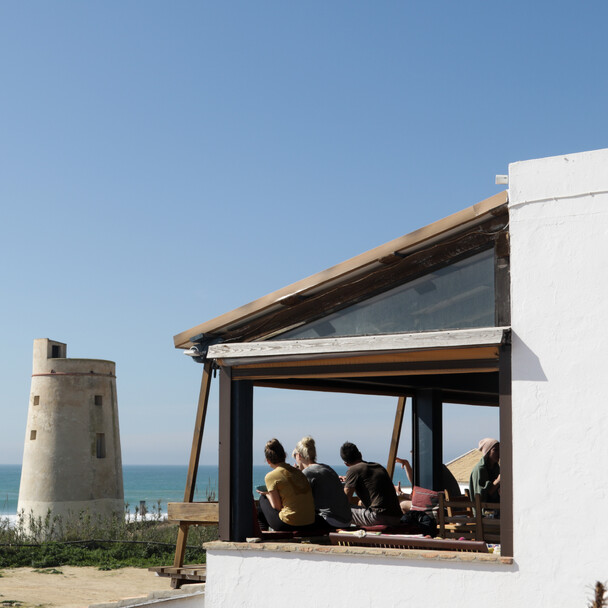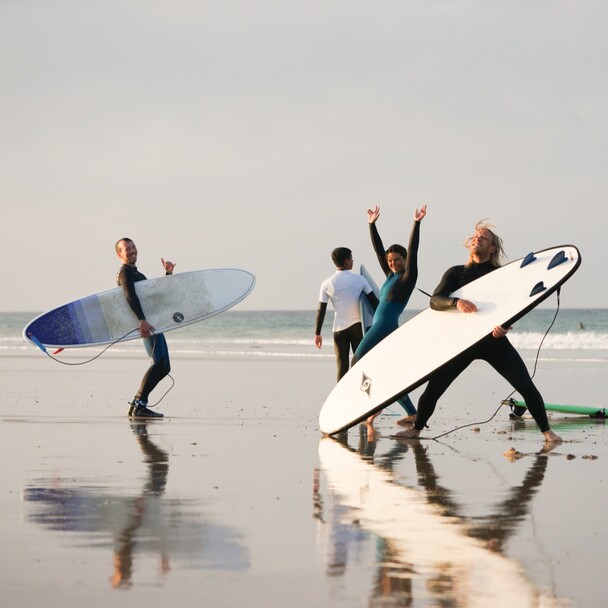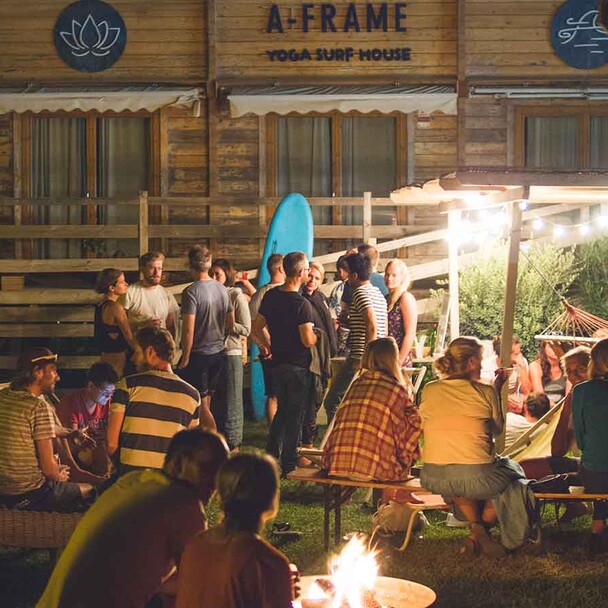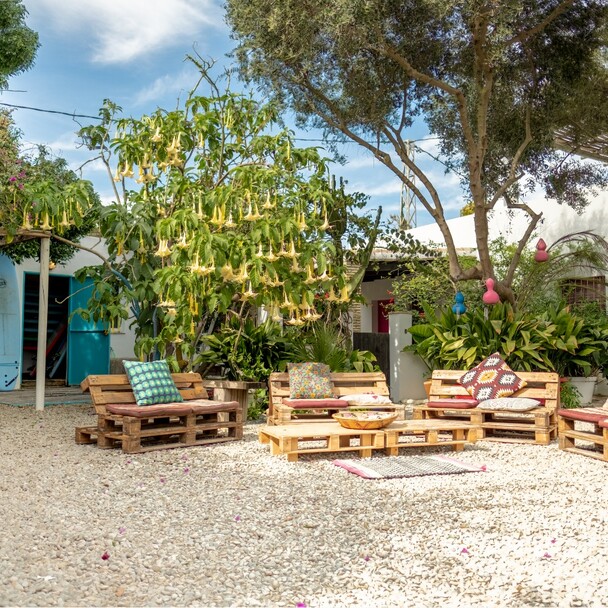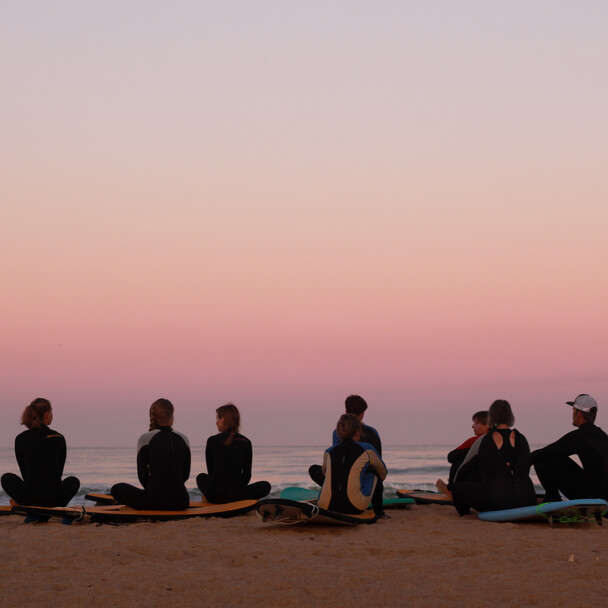Surf vacation beginners: The perfect introduction to surfing
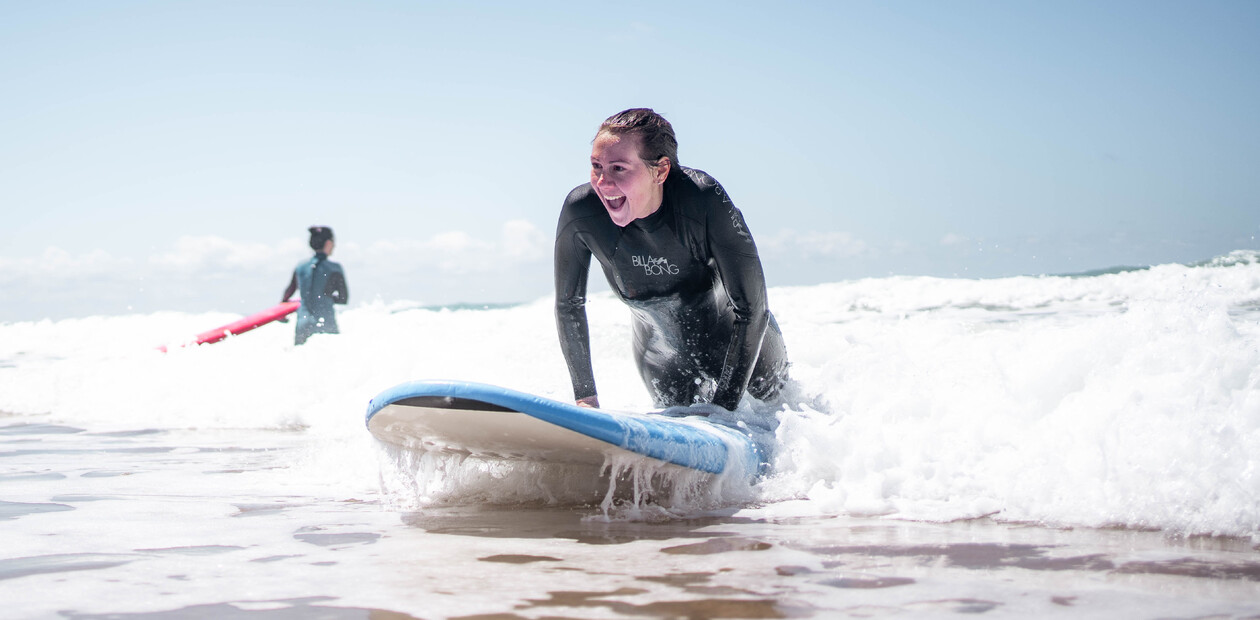
- Introduction: Surf vacation beginners
- Where to learn to surf?
- The best surf spots for beginners
- Surfing for beginners Europe
- Surfing vacation in Spain
- Surfing vacation in southern Spain?
- What you should look out for on your surfing vacation as a beginner
- Surf vacation beginners kids
- What to look out for on a surfing vacation with children
- Your family surf vacation
- Why choose a surf camp?
- Advantages of surf camps for beginners
- What can you expect at a surf camp?
- How to choose the right surf camp
- The A-Frame surf camp in El Palmar
- Equipment tips for beginners
- Preparing for your surfing vacation
- Packing list for your surfing vacation beginners
- Safety in the water
- Activities away from surfing
- Yoga at A-Frame Surfcamp & Yoga Retreats
- Conclusion surf vacation beginners
Introduction: Surf vacation beginners
A surfing vacation is the perfect opportunity to get to know the exciting world of surfing and take your first steps on the board. For many people, surfing is not just a sport, but a lifestyle that combines freedom, closeness to nature and adventure. As a beginner, getting started may seem challenging at first, but with the right preparation and a well-chosen surf spot, your first surfing vacation can be an unforgettable experience.
Surfing is one of the oldest and most fascinating water sports in the world. The feeling of riding a wave is hard to put into words - it's a mixture of adrenaline, happiness and deep peace. It's no wonder that many surfers describe this experience as one of the best ever and become downright addicted to it. However, as with any new sport, surfing requires a certain amount of practice and patience, especially at the beginning. The good news: with the right conditions and a positive attitude, you too will soon be able to master your first waves.
For your first surfing vacation as a beginner, there are a few important points you should bear in mind to get the most out of your trip. Choosing the right location is crucial - a surf spot with gentle, consistent waves and little current is ideal for beginners. Equally important is deciding whether you want to learn in a surf camp or take individual surf lessons. Surf camps often offer the advantage of not only professional surf lessons, but also a community of like-minded people, accommodation and catering.
This guide is designed to help you plan your surfing vacation in the best possible way and provide you with the most important information and tips. From choosing a surf spot and the right equipment to practical advice on preparation and safety - you'll learn everything you need to know to successfully immerse yourself in the world of surfing as a beginner. Let's take the first step on your surfing adventure together and find out why surfing inspires so many people around the world!
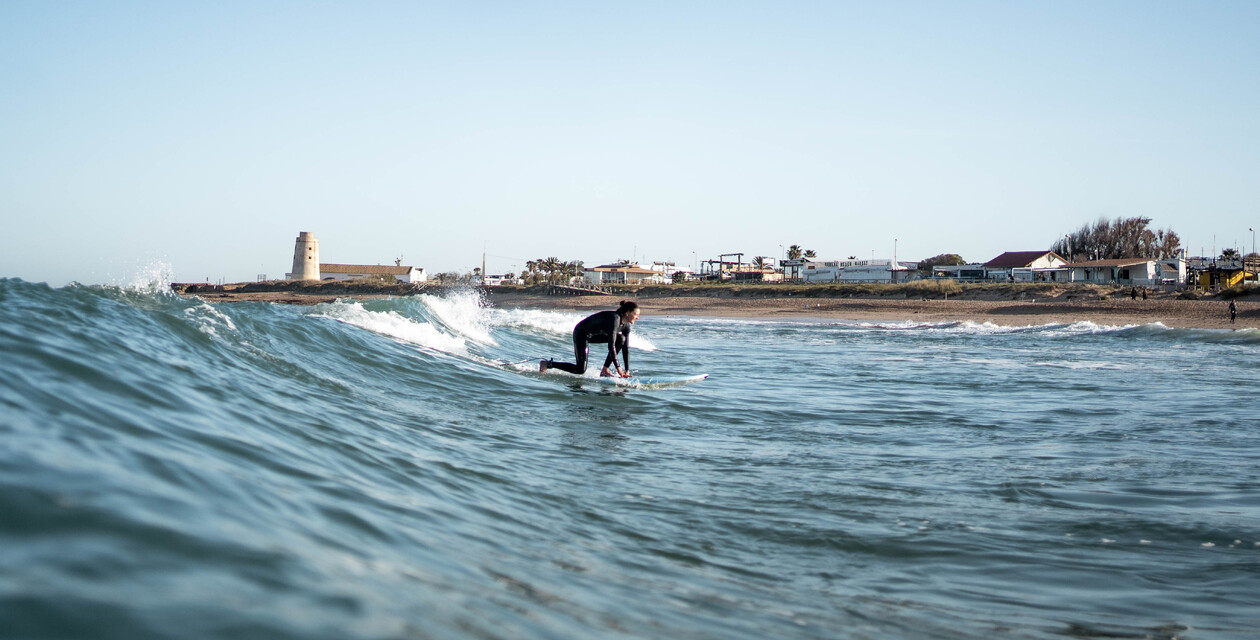
Where to learn to surf?
Before you start your surfing vacation for beginners, you have to make the most difficult decision: Where to go? The world is basically your oyster, as you can surf in countless places. Australia, California, Hawaii, Indonesia, South Africa and Europe are particularly well-known. To keep the ecological footprint as low as possible, we always like to recommend Europe for a surfing vacation - for beginners and advanced surfers alike. This is because the journey by plane is short and, depending on the time, you can even travel there in your own car.
The best surf spots for beginners
Europe: Perfect spots to get you started
El Palmar, Spain:
El Palmar is a picturesque surf spot on the Costa de la Luz in Andalusia. With its extensive sandy beaches and gentle beach break waves, it offers ideal conditions for beginners. The surf spot is surfable all year round, but the best months are from March to November, when the waves are more consistent and the temperatures are more pleasant. In addition to the perfect waves, El Palmar also offers a relaxed atmosphere, charming cafés and a lively surf culture.
Peniche, Portugal:
Renowned as one of the best surf destinations in Europe, Peniche offers a variety of surf spots for all skill levels. For beginners, Baleal beach is particularly suitable as it has soft, slow waves that are ideal for learning the basics of surfing. The surfing season here lasts all year round, with the summer months from May to October being particularly recommended. Peniche also offers numerous surf schools and camps that offer professional courses for beginners.
Biarritz, France:
The French town of Biarritz on the Atlantic coast is a classic European surf spot. With its wide sandy beaches and consistent wave structure, Biarritz is ideal for beginners. The beach of La Côte des Basques is particularly known for its gentle waves, which are perfect for practicing. The best surfing months are from May to October. In addition to surfing, Biarritz offers a rich culture, excellent gastronomy and a charming old town.
Worldwide: dream destinations for beginners
Taghazout, Morocco:
Taghazout is a small fishing village on the Moroccan Atlantic coast that has become a hotspot for surfers. With constant waves and a variety of surf spots suitable for both beginners and advanced surfers, Taghazout is an ideal destination for your first surfing vacation. The "Panorama Beach" spot is particularly suitable for beginners as it offers gentle, long waves. The best months for surfing are from October to April. In addition to surfing, you can also enjoy Moroccan culture and cuisine here.
Bali, Indonesia:
Bali is a paradise for surfers and offers numerous spots that are perfect for beginners. Kuta beach in particular is known for its gentle waves and soft sandy bottom, which is ideal for making your first attempts on a surfboard. The best surfing months are from April to October, when the waves are consistent and the conditions are optimal. Bali not only offers first-class surfing conditions, but also a unique culture, breathtaking landscapes and a vibrant nightlife.
Byron Bay, Australia:
Byron Bay is a legendary surf spot on the east coast of Australia and offers ideal conditions for beginners. The beach "The Pass" is particularly known for its long, gentle waves, which are perfect for surfing beginners. The best time to surf in Byron Bay is from March to November. The town itself offers a relaxed atmosphere, a lively surf scene and numerous yoga studios that are perfect for relaxing after surfing.
These surf spots not only offer perfect conditions for beginners, but also a unique atmosphere and numerous additional activities that will make your surfing vacation unforgettable. Whether you're staying in Europe or embarking on a trip around the world, choosing the right surf spot is the first step to a successful and exciting surfing vacation.
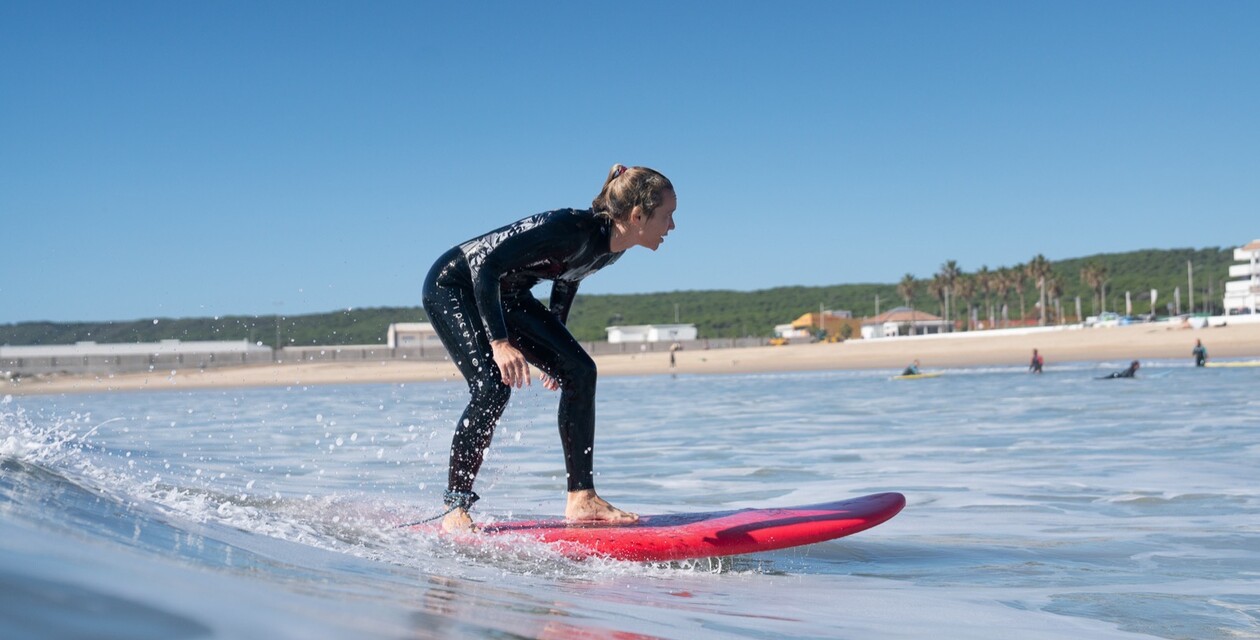
Surfing for beginners Europe
The surfing conditions in Europe are really great. Both beginners and advanced surfers will find excellent waves here. The entire Atlantic coast can be seen as a huge playground for surfers. Europe is therefore perfect for a surfing vacation for beginners.
France, Portugal, Spain, even England (Cornwall) and Ireland - you can surf almost everywhere. You can even surf in northern Germany, Holland, Denmark and Norway. There is a real "coldwater" scene there. Here, some hard-core surfers plunge into the water to surf even when the water temperature is 7-10 degrees. With the right wetsuit, gloves, a hood and booties, almost anything goes. Of course, it's more fun in mild temperatures. That's why most people actually travel to France, Spain or Portugal to surf. All three countries offer excellent conditions for beginners.
Surfing vacation in Spain
Learning to surf is most fun in mild temperatures. When the sun is shining, the sea glistens deep blue and white foam forms on the waves, the surfing is simply so beautiful that learning to surf is all the more enjoyable. In the south of Spain, in Andalusia, you can find these conditions almost all year round.
This is also where our surf camp is located: in the cozy coastal town of El Palmar. The air and water here are actually mild all year round and the climate is the same as in California. This means that even in winter, the sun usually shines here and we usually celebrate Christmas in T-shirts. And best of all, there's always a wave rolling here. This spot is particularly suitable for beginners, as the beach, Playa El Palmar, is several kilometers long, so there is always a place to practice surfing. There is also a so-called beach break (sandy ground), which is perfect for beginners.
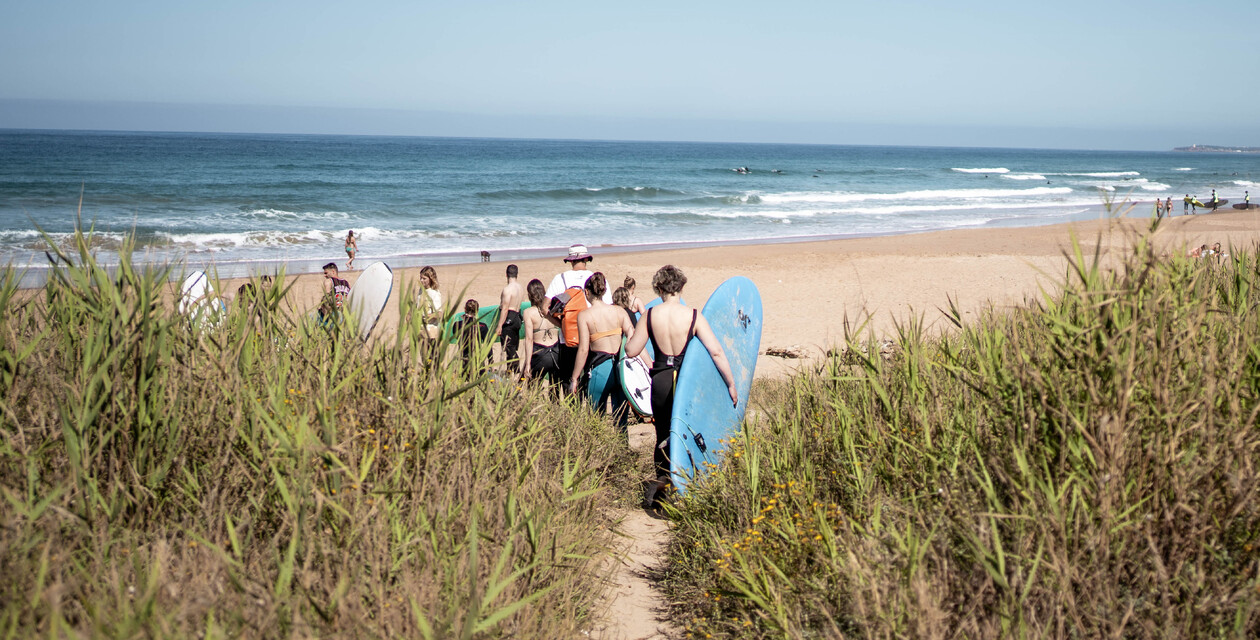
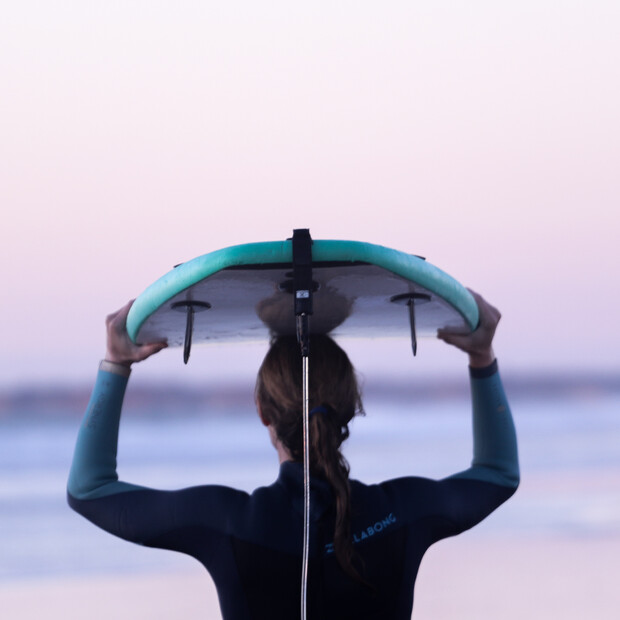
Surfing vacation in southern Spain?
The perfect place for a surfing vacation is El Palmar. Beginners and advanced surfers will find their wave here. Book your unforgettable surf adventure at A-Frame Surfcamp & Yoga Retreats now.
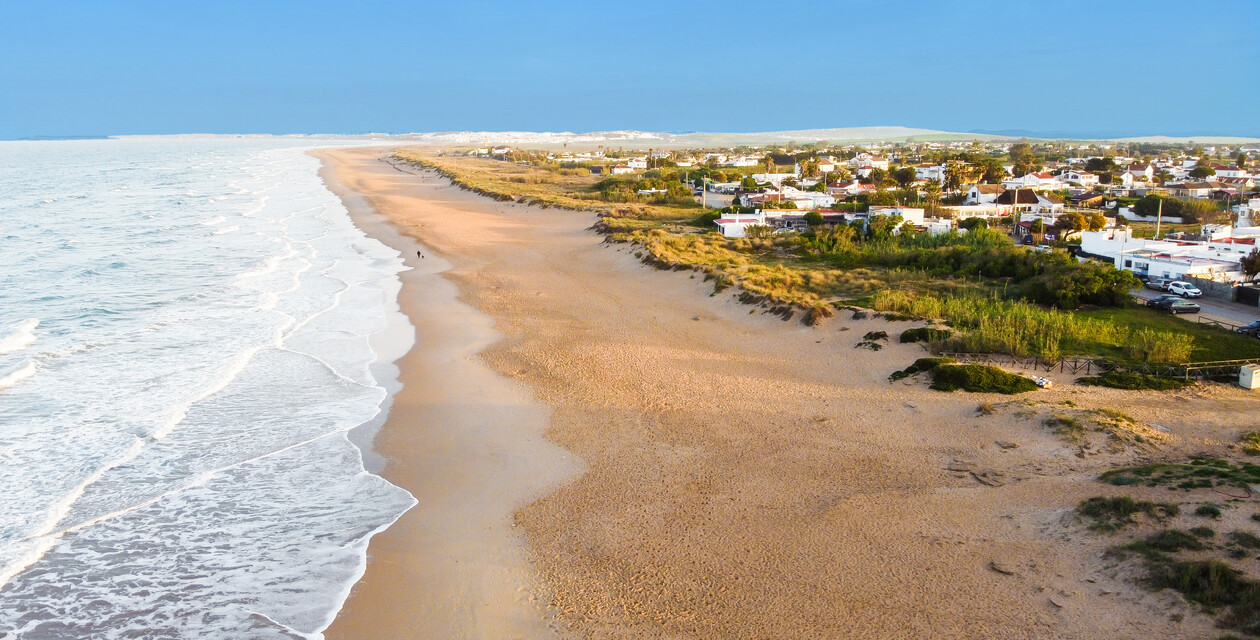
What you should look out for on your surfing vacation as a beginner
A surfing vacation as a beginner is an exciting opportunity to discover the world of surfing and master your first waves. To make your first surfing vacation an unforgettable experience, there are a few important aspects to consider. In this section, you'll find out what you should pay particular attention to in order to make your first steps in surfing successful and enjoyable.
Beach break: As mentioned above, a beach break definitely makes surfing more relaxed for beginners than a reef, for example. This is because the risk of injury is lowest here due to the sandy ground. In the beginning, it's easy to slip off the surfboard when you first try to stand up and fall softly into the sand or water. White water (the white foam of already broken waves) is great for practising surfing at a beach break.
Currents: Ideally, there are no dangerous currents when you are learning to surf. The surf instructors at a good surf school will point this out to you during your surf course. If you are practising surfing on your own, it is best to ask a lifeguard (if available) or a more experienced surfer. You can find out more about this in our blog text on surf spot check.
Lots of space to learn to surf: There is usually a lot going on at the good and well-known surf spots, which is often unavoidable. But maybe you can find a beach with a little more space for your first surfing attempts so that you don't get in each other's way. Playa El Palmar, for example, is 8 km long. Here, the peaks are spread out so that beginners can always find a patch of white water that is not occupied by other surfers.
Weather & climate: Of course, you can't plan for good weather. And of course it's not primarily important, because you can also surf great in clouds and rain. Nevertheless, surfing is more fun when it's warm and sunny. That's why I would advise beginners to make sure that everything is just right on their first surfing vacation. Surfing is so much more fun when the sun is shining and the sea is glistening turquoise. This also makes the warm-up and theory on the beach more relaxed.
In El Palmar, for example, the sun shines over 300 days a year. Even in the winter months, temperatures here rarely fall below 18-20 degrees. The chances of a sunny surfing vacation here are therefore very good. There are also first-class surfing conditions for beginners all year round.
Tip: Remember to apply sufficient sun protection factor (face, hands, feet, soles of the feet, everything that is not covered by a wetsuit or swimwear), ideally surf zinc on the face. Sun protection is also important on cloudy days.
Surf camp / surf school: You'll be spoilt for choice. There are now countless surf camps and surf schools around the world. It's important to find the camp that best meets your needs. Set a budget and ask yourself what you expect from your surfing vacation as a beginner. Would you like to travel by camper and only book the surf courses or would you prefer to travel by plane and rent a surf camp? Do you value nice accommodation and good food, yoga, massages and beautiful nature or culture in the region? Based on these criteria, you can narrow the circle and find the right surf camp for you. Other decisive factors are the group size of the surf courses and the certification of the surf instructors. I'll get to that in the next few paragraphs.
Tip: If you're the kind of holidaymaker who appreciates delicious food with sea views, enchanting accommodation, yoga classes and beautiful surroundings in addition to a good surf course, then the A-Frame surf camp in El Palmar will definitely be of interest to you. Located in Europe, the journey is practically a stone's throw away. Due to its southern location, this place is also perfect in winter for a great surf vacation for beginners (and advanced surfers).
Surf instructors & surf courses: When choosing your surf vacation, the surf instructors are of course also crucial. It is important that the surf coaches are ISA certified and have completed a Life Saver. The ISA license is the only training recognised worldwide by the ISA (International Surfing Association) and provides everything you need to teach in a surf school or surf camp. You can usually find out whether coaches have this certification on the website or by email.
Furthermore, it is always good if the surf instructors are not only on the beach, but also in the water. Ideally, surf lessons should consist of a mix: sometimes watching from the beach or filming (video analysis) and sometimes being in the water, close to the surf student.Tip: The smaller the group, the better. This is because the fewer surf students a surf coach looks after, the better they can take care of each individual. As a guideline, you can say that around six to eight surf students per surf instructor is ideal.
Quality of the surf equipment: Well-maintained surf equipment is always an indication of a surf school that values quality. High-quality surfboards and good wetsuits speak for the surf school. If the wetsuits are washed and disinfected after use and the surfboards are cleaned and stored properly, that's another plus point.
Surf vacation beginners kids
A surfing vacation for beginners with children can be an unforgettable family adventure that combines fun and learning opportunities. To ensure that the surfing vacation is as enjoyable and safe for the little surfers as it is for the adult participants, some special considerations and preparations are necessary.
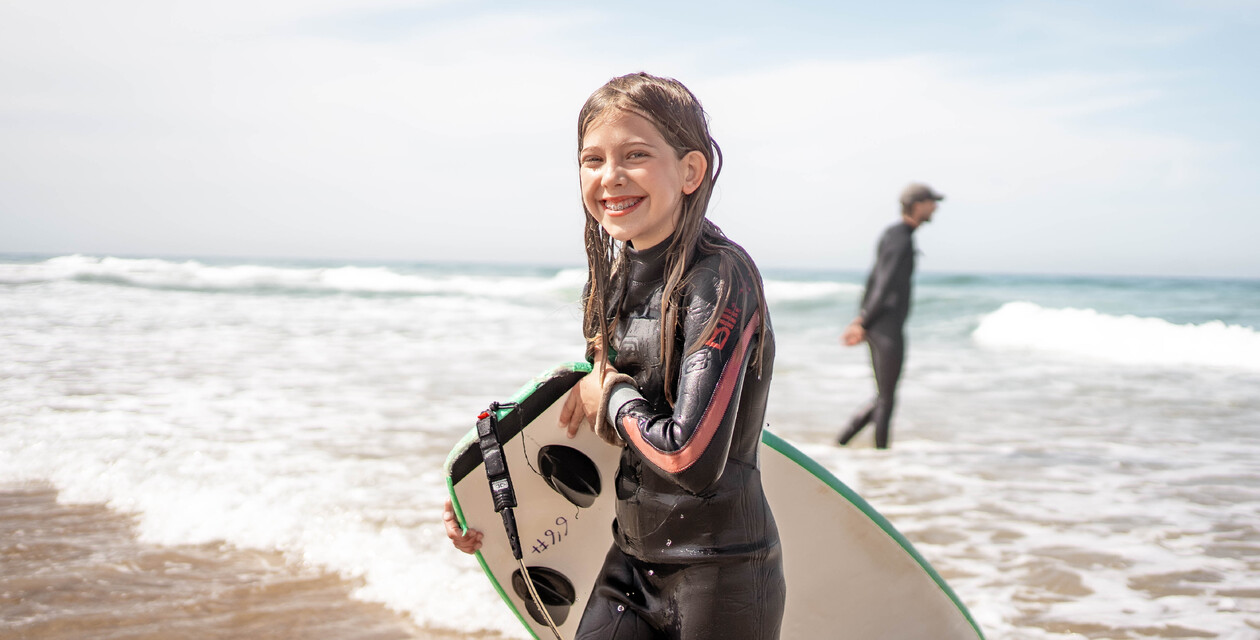
What to look out for on a surfing vacation with children
Choosing the right destination
Choose a surf spot that is suitable for beginners and offers gentle, consistent waves. Places like El Palmar in Spain or the coast of Portugal are known for their beginner-friendly conditions. Make sure that the beach slopes gently and the water is not too deep.
Surf schools and surf camps for children
Surf schools and surf camps that offer special courses for children are ideal. These courses are led by experienced instructors who know how to make the lessons safe and fun. Children learn in small groups and receive individualized instruction.
Safety
Safety is paramount. Children should always wear wetsuits to keep them warm and protect them from injury. They should also wear life jackets or special surf vests that give them extra buoyancy. Another important aspect is sun protection - sun cream, hats and rashguards are essential.
Patience and motivation
Children learn through play and have their own rhythm. It's important to be patient and give children space to learn to surf at their own pace. Praise and motivate them regularly to maintain their enthusiasm.
Family-friendly activities
In addition to surfing, the resort should also offer other child-friendly activities. Whether it's beach games, visits to water parks or exploring nature - a varied program ensures that the surfing vacation remains exciting for the whole family.
Packing list for the surfing holiday
Make sure you have everything you need with you: Wetsuits, sun protection, suitable swimwear, towels, snacks and plenty of drinks. A first aid kit should also always be to hand.
A well-planned surfing vacation can be an exciting and educational experience for beginners and children alike. With the right preparation and the right conditions, you can experience unforgettable moments on the waves together and awaken a love of surfing in the whole family.
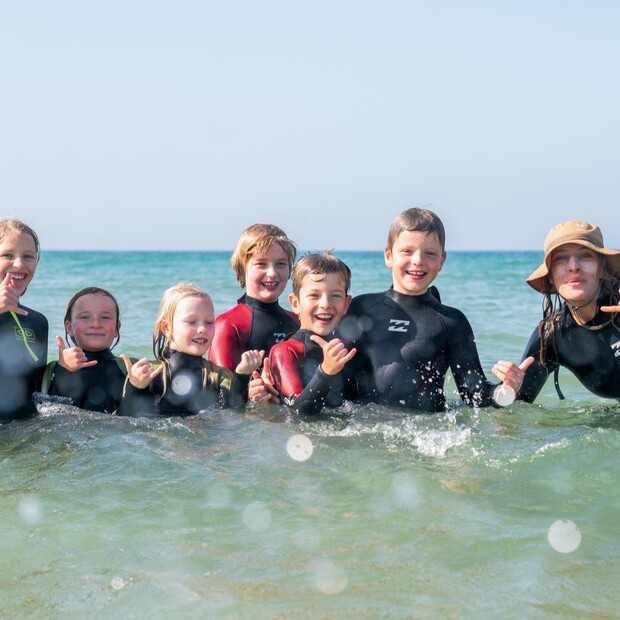
Your family surf vacation
Want a surfing vacation for the whole family? The A-Frame surf camp specializes in families with children of all ages. There is a playroom, childcare, highchairs and much more. During the family weeks, families take center stage.
Why choose a surf camp?
A surf camp is the perfect choice for beginners planning their first surfing vacation. It offers a variety of benefits that make it easier to get into the sport and enrich the whole experience. Here are some reasons why you should choose a surf camp for your surfing vacation:
Advantages of surf camps for beginners
Professional instruction:
Surf camps offer qualified and experienced surf instructors who will introduce you to the techniques of surfing step by step. These instructors know exactly how to support and motivate beginners so that you progress quickly and feel confident. The lessons are often tailored to the needs of beginners, which makes the learning process more efficient and enjoyable.
Structured learning environment:
Another advantage of surf camps is the structured learning environment. You have a clear timetable with regular surf courses, theory lessons and practical exercises in the water. This structure helps you to continuously work on your skills and achieve the best possible learning success. You'll also receive valuable feedback from your instructors to help you improve your technique.
Full equipment:
Most surf camps offer full equipment included in the price. This means you don't have to worry about which surfboard or wetsuit you need. Everything you need is provided for you so that you can concentrate fully on surfing.
What can you expect at a surf camp?
Community and new friendships:
A surf camp offers the opportunity to meet like-minded people from all over the world. You share your passion for surfing with other beginners and can make new friends. This sense of community helps you feel comfortable and supported, which is especially important for beginners.
Variety of activities:
In addition to surfing, many surf camps offer additional activities such as yoga classes, beach volleyball, barbecues and excursions to local attractions. These activities provide variety and make your surfing vacation even more exciting and diverse. Yoga, for example, is an excellent complement to surfing as it promotes flexibility and balance, both of which are crucial when surfing.
Accommodation and meals:
Accommodation and meals are usually included in a surf camp. You can choose between different accommodation options, from simple dormitories to private rooms. Catering often consists of healthy and nutritious meals that are specially tailored to the needs of surfers.
How to choose the right surf camp
Location and surfing conditions:
Make sure that the surf camp is located in a place that offers suitable surfing conditions for beginners. Gentle, consistent waves and a safe beach without strong currents are ideal. Find out in advance about the surfing conditions and the best time to travel to your chosen destination.
Experiences and reviews:
Read testimonials and reviews from other participants to get a feel for the quality of the surf camp. Positive feedback about the instructors, the equipment and the general atmosphere of the camp is a good sign that you're making a good choice.
Courses and activities on offer:
Check out the surf camp's range of courses and additional activities. A varied programme with different courses and leisure activities will ensure that you never get bored during your stay and that you can get the most out of your surfing vacation.
A surf camp is the ideal solution for beginners who want to learn to surf in a supportive and well-organized environment. It gives you the opportunity to progress quickly, make new friends and have an unforgettable time by the sea. Book your place at a surf camp now and start your surfing adventure!
The A-Frame surf camp in El Palmar
We have now mentioned our surf camp so often in the text that we would like to present it again here:
The A-Frame surf camp is located in the relaxed surfing town of El Palmar. Spending your vacation here is ideal for both surf beginners and advanced surfers. There are waves all year round, especially for beginners. At the beginning, you usually practise in white water anyway. Better surfers then look for a green wave further back, in the so-called line-up. At Playa El Palmar, you won't find any rocks or dangerous currents at the surf spot, which is why surf beginners can let off steam wonderfully. Incidentally, the beach is right next to the surf camp. All you have to do is walk out the door and you're practically standing on the beach. You can watch the waves from the terrace at breakfast and watch the sunset at dinner.
For beginners we have softboards, which are perfect for your first attempts at surfing. They have a lot of buoyancy and you don't have to paddle as much. This means you can concentrate fully on your balance and getting up on the board during your first surf lessons. Based on a video analysis, our surf instructors will work with you to identify small posture errors, which you can then correct together. Your surf coach is ISA-certified and always close by. The groups in the surf courses are small so that the surf instructors can focus on each individual.
Well-being: Apart from the quality of the surf courses, we attach great importance to the feel-good factor. Between surf lessons, you can relax on our terrace and watch the waves. Rumor has it that one or two dolphins have been spotted from here. Fresh, healthy and delicious food is conjured up every day, so you'll be spoiled all round on your surfing vacation. You just have to surf yourself ;-)
Equipment tips for beginners
The right surfboard choice: softboards vs. hardboards
Choosing the right surfboard is crucial for success and enjoyment when surfing. As a beginner, it is important to choose a board that offers stability and safety. Softboards are usually the best choice for beginners. They are equipped with a soft surface that minimizes the risk of injury and provides more buoyancy, which makes paddling and standing up on the waves easier.
Softboards are available in different sizes, and it is advisable to choose a larger board as they offer more stability and are easier to control. A board with a length of 7 to 9 feet is ideal for beginners. Once you have gained more experience and feel confident on the board, you can switch to a hardboard, which is usually faster and more maneuverable.
Wetsuits: What thickness for what water temperatures?
A wetsuit is essential for staying warm and comfortable while surfing. The thickness of the suit depends on the water temperature of your surf spot. Here are some general recommendations:
Tropical waters (above 24°C): A thin shorty wetsuit (1-2mm) or a lycra rashguard is enough to protect you from the sun and possible abrasions.
Moderate waters (17-23°C): A wetsuit with a thickness of 3/2mm is ideal. This offers sufficient protection from cooler water and still allows good freedom of movement.
Cold water (10-16°C): A 4/3mm wetsuit is necessary to keep you warm. In very cold water (below 10°C), you should wear a 5/4mm wetsuit, possibly with neoprene gloves, boots and a hood.
Additional equipment: leash, wax and more
In addition to the surfboard and wetsuit, there are other items of equipment that will make your surfing vacation as a beginner more enjoyable and safer:
Leash: The leash connects your ankle to the board and prevents it from drifting far away after a fall. This is particularly important for beginners to keep the board close at all times and avoid unnecessary paddling.
Wax: Surfboard wax provides a better grip on the board. Apply it to the surface of your board to prevent slipping.
Rashguard: A rashguard protects your skin from chafing and sunburn. It can be worn under a wetsuit or on its own, depending on the water temperature.
Fins and leash plug: Check your board for the correct mounting of fins and a stable leash plug to make sure everything is secure and working well.
A well-prepared surfing vacation as a beginner starts with the right equipment. By making sure you choose the right surfboard, wetsuit and other essential equipment, you lay the foundation for a safe and fun surfing experience. With the right equipment, you'll be perfectly equipped to conquer the waves and enjoy surfing to the full!
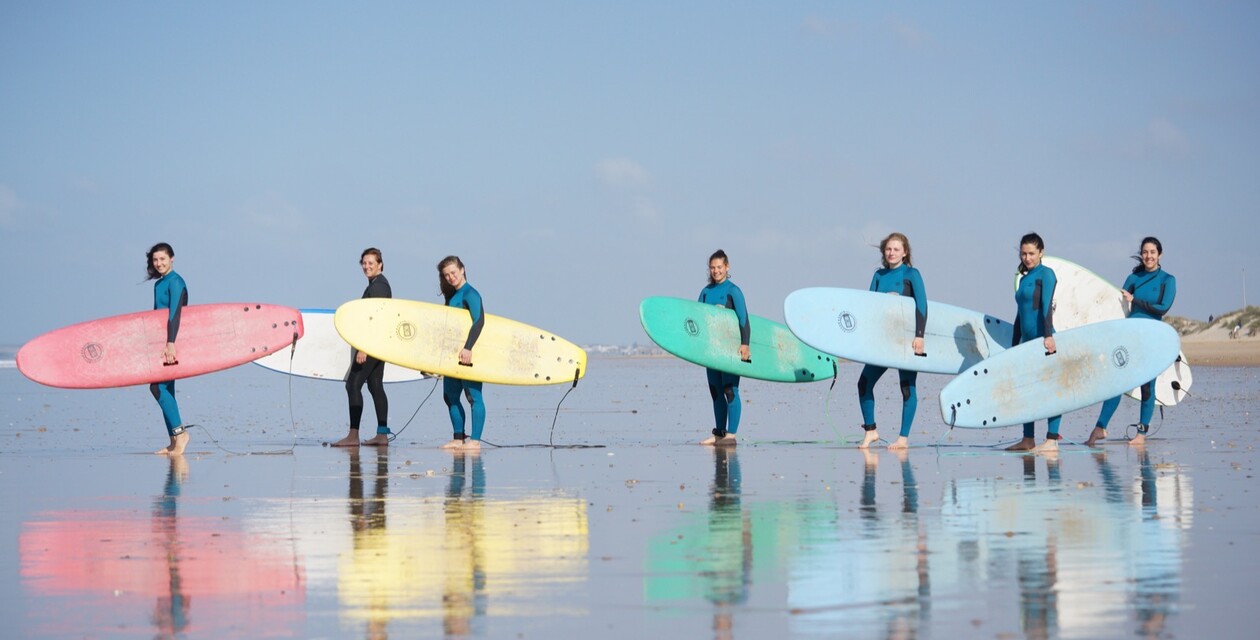
Preparing for your surfing vacation
Physical preparation: fitness and stretching exercises
A successful surfing vacation for beginners starts long before you dive into the water with the right physical preparation. Surfing requires a combination of strength, endurance and flexibility. Here are some exercises to help you prepare optimally:
Strength training: Exercises such as push-ups, pull-ups and planks strengthen the muscles in your upper body that you need for paddling and standing up on the board. Leg exercises such as squats and lunges are also important to improve balance and stability.
Endurance training: Regular endurance training such as running, swimming or cycling improves your cardiovascular fitness, which is essential for long paddle sessions and general endurance when surfing.
Stretching exercises: Flexibility is crucial to be able to perform the movements on the surfboard smoothly and safely. Yoga and specific stretching exercises for the back, shoulders and legs can help prevent injuries and improve your flexibility.
Mental preparation: the right mindset for learning
Learning to surf can be challenging, especially for beginners. The right mental attitude is therefore just as important as physical preparation. Here are some tips to help you mentally prepare for your surfing vacation:
Patience: Surfing requires patience and perseverance. It's normal that you need time to master the basics. Set realistic goals and celebrate small progress.
Positive attitude: A positive attitude will help you stay motivated even when you experience setbacks. Remind yourself that every surfer was once a beginner and that mistakes are part of the learning process.
Visualization: Imagine yourself successfully riding a wave. This technique can help you build confidence and improve your movements.
What to consider before you go
Careful planning in advance will ensure that your surfing vacation as a beginner goes smoothly and you can concentrate fully on surfing. Here are some practical tips:
Travel insurance: Make sure you have comprehensive travel insurance that also covers water sports such as surfing. This will protect you in the event of accidents or injuries.
Health check: A health check before your trip can ensure that you are physically fit enough for surfing. Especially if you have not been active for a long time, it is advisable to have a medical check-up.
Packing list: Pack according to the weather conditions and the requirements of your surf camp. In addition to basic equipment such as a wetsuit and surfboard, if not available locally, you should also think about sun protection, towels, swimwear and comfortable clothing. A comprehensive packing list will help you not to forget anything important.
Find out about the surf spot: Familiarize yourself with your destination in advance. Find out about the local surfing conditions, weather and tide forecasts and cultural particularities. This will help you to find your way around more quickly and adapt to the local conditions.
Thorough preparation - both physically and mentally - will lay the foundations for a successful and unforgettable surfing vacation as a beginner. This way, you can concentrate fully on surfing and enjoy the beauty of the ocean to the full.
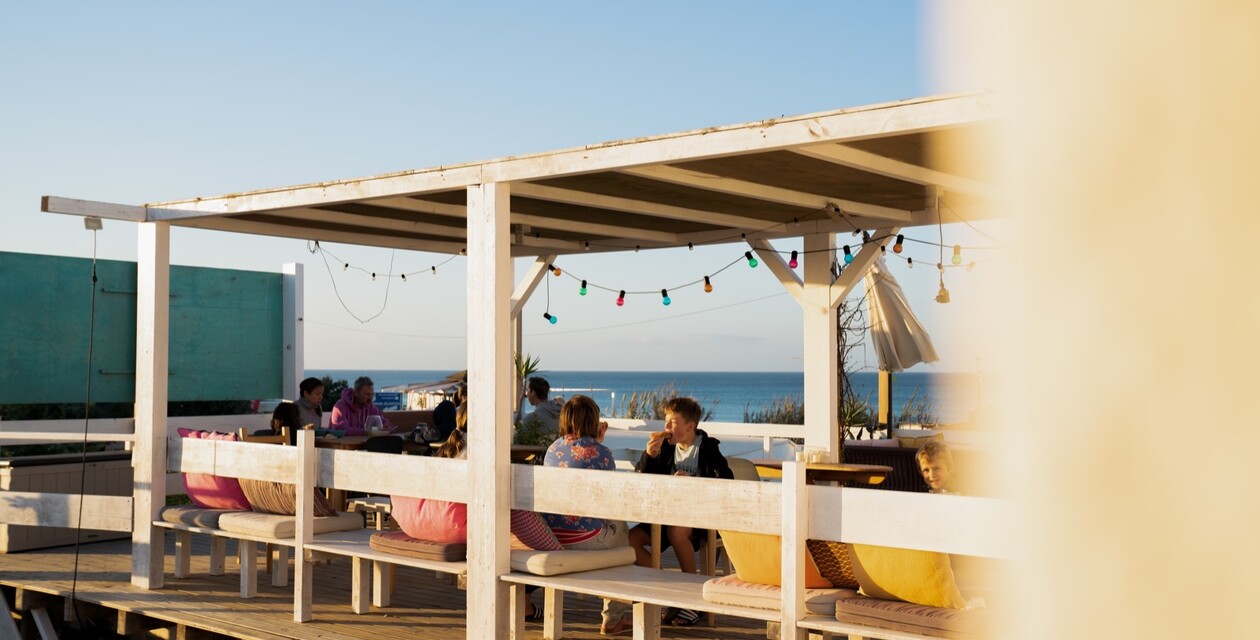
Packing list for your surfing vacation beginners
A well-thought-out packing list ensures that you start your surfing vacation well prepared. Here are the most important things you should take with you:
Surfboard: If not available at the surf camp or if you prefer to bring your own.
Wetsuit: Depending on the water temperature, in the right thickness (1-5mm).
Leash: To connect the board to your foot and prevent loss.
Wax: For a better grip on the surfboard.
Rashguard: To protect against chafing and sunburn.
Towels: Several to always have a dry one to hand.
Swimwear: Several change sets.
Sun protection: High SPF sunscreen, sun hat and sunglasses.
Comfortable clothing: For when you're not surfing.
Flip-flops or sandals: For the beach.
Sportswear: For yoga or other activities at camp.
Drink bottle: To stay hydrated during surfing and activities.
Travel first-aid kit: With personal medication and basic first-aid items.
Backpack or bag: For day trips or to carry your equipment to the beach.
Travel documents: Passport, visa (if required), booking confirmations and travel insurance.
By preparing thoroughly - both physically and mentally - you'll lay the foundations for a successful and unforgettable surfing vacation as a beginner. This way, you can concentrate fully on surfing and enjoy the beauty of the sea to the full.
Safety in the water
The basics of water safety
Water safety is especially important if you're planning a surfing vacation as a beginner. Proper preparation and awareness of potential hazards are crucial to ensure a safe and enjoyable surfing experience. Here are some essential aspects to consider:
Know the conditions: Before you get in the water, find out about the current surfing conditions. Websites like Surfline offer detailed forecasts to help you choose the best time and place to surf. Pay attention to tides, wave height and wind conditions.
Spot check: Observe the surf spot before you go in. Watch out for currents, reefs and other potential dangers. Talk to local surfers or lifeguards to get valuable tips and information.
Learn the signs and signals: Familiarize yourself with the international hand signs and signals used when surfing. These can be life-saving in emergencies and help to avoid misunderstandings in the water.
Recognizing and dealing with currents
Currents are one of the biggest dangers when surfing, especially for beginners. Here are some tips for recognizing currents and reacting to them correctly:
Recognizing currents: Currents are often recognizable by areas where the water looks different from the rest of the ocean. This can be a calmer expanse of water or areas with foam and eddies.
How to act: If you get caught in a current, don't try to paddle directly against it. Instead, paddle parallel to the shore until you're out of the current and then return to shore.
Surfing in a group and contingency plans
Surfing in a group is always safer than surfing alone. Here are some benefits and tips for surfing in a group:
Support: Surfing in a group offers you support and help in the event of an accident or injury. Your surfing partners can help you get help in time.
Visibility: A group of surfers is more visible to lifeguards and other surfers. This increases the chances of being found quickly in an emergency.
Emergency plans: It's important to have an emergency plan and discuss it with your group. Make sure everyone knows what to do in the event of an injury, current problem or other emergency.
Respect and mindfulness in the water
Safety in the water also means being respectful and mindful of other surfers. Here are some rules of conduct that you should follow:
Respect the right of way rules: In surfing, there are clear rules about who has the right of way. The surfer closest to the peak of the breaking wave has priority. Avoid cutting other surfers or taking the wave from them.
Be aware of your surroundings: Always be aware of what's going on around you. Keep your distance from other surfers and pay attention to the waves and currents.
Communication: Communicate with other surfers in the water. A simple nod or wave can avoid misunderstandings and shows that you are paying attention.
Conclusion
Water safety should be a top priority for every beginner on a surfing vacation. By following these safety rules and learning the basics of water safety, you can ensure that your surfing vacation is not only exciting, but also safe and memorable.
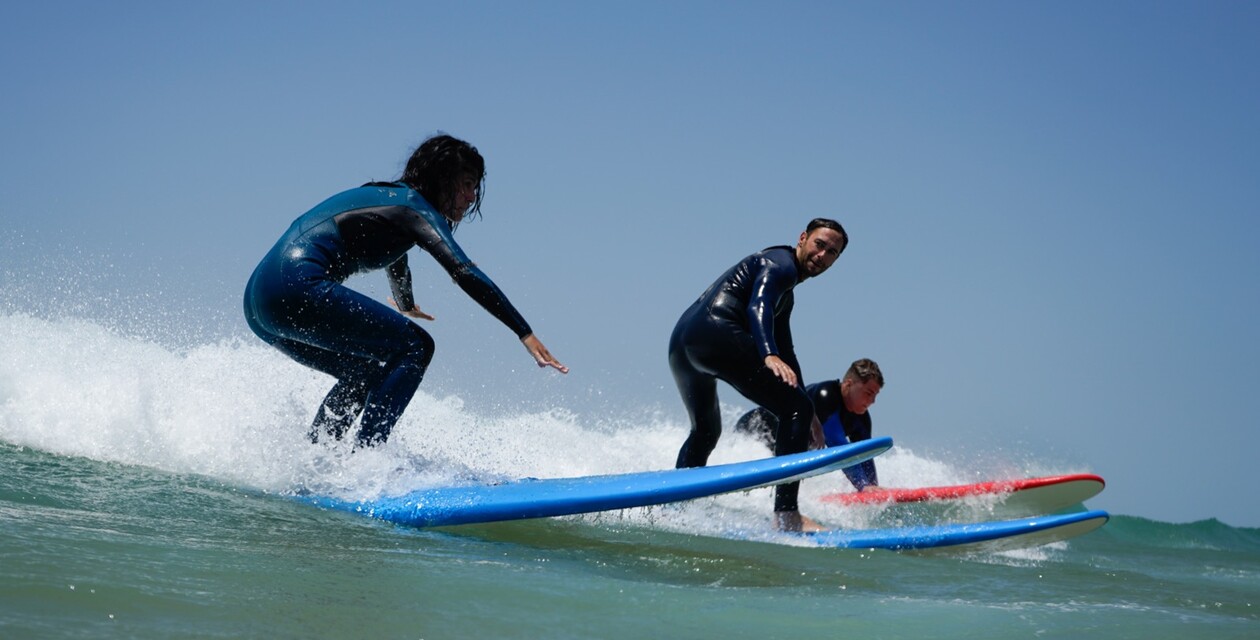
Activities away from surfing
Relaxation and recuperation
A surfing vacation for beginners not only offers the opportunity to take your first steps on the surfboard, but also to enjoy time away from the waves and relax. Here are some activities you can do during your surf breaks:
Yoga and meditation: Many surf camps offer yoga classes, which are a perfect complement to surfing. Yoga helps to improve flexibility and balance, which has a positive effect on your surfing skills. It also promotes relaxation and regeneration after a strenuous day of surfing.
Wellness and spa: Treat yourself to a massage or visit a spa to relax your muscles and refresh your mind. Wellness facilities are often located near popular surf spots and offer various treatments to help you relax.
Exploring the surrounding area
Aside from surfing, there are often many interesting places and sights to discover:
Nature hikes and national parks: Explore the surrounding area by hiking or visiting national parks. Many surf destinations are located in breathtaking landscapes that are waiting to be discovered. Enjoy nature, observe the local wildlife and get some fresh air.
Cultural excursions: Immerse yourself in the local culture by visiting nearby towns, villages or historical sites. Learn more about the history and traditions of the region and try local specialties in authentic restaurants.
Adventure activities: For those seeking adventure, there are often many activities such as climbing, mountain biking or kayaking. These activities offer an exciting change from surfing and will get your adrenaline pumping.
Culinary experiences
Enjoy the culinary highlights of the region. Here are some tips:
Local markets: Visit local markets to discover fresh produce and handmade goods. Try exotic fruits, regional specialties and strike up a conversation with the locals.
Cooking classes: Take part in a cooking class and learn how to prepare traditional dishes from the region. This is a great way to learn more about the local culture and acquire new skills at the same time.
Community and leisure
Spending time with other surfers and participants of your surf camp can also be very enriching:
Community activities: Many surf camps organize evening community activities such as BBQs, campfires or game nights. These events offer a great opportunity to make new friends and share experiences.
Workshops and courses: In addition to surfing and yoga courses, some camps also offer workshops in photography, art or music. These additional offers can enrich your vacation and introduce you to new hobbies and interests.
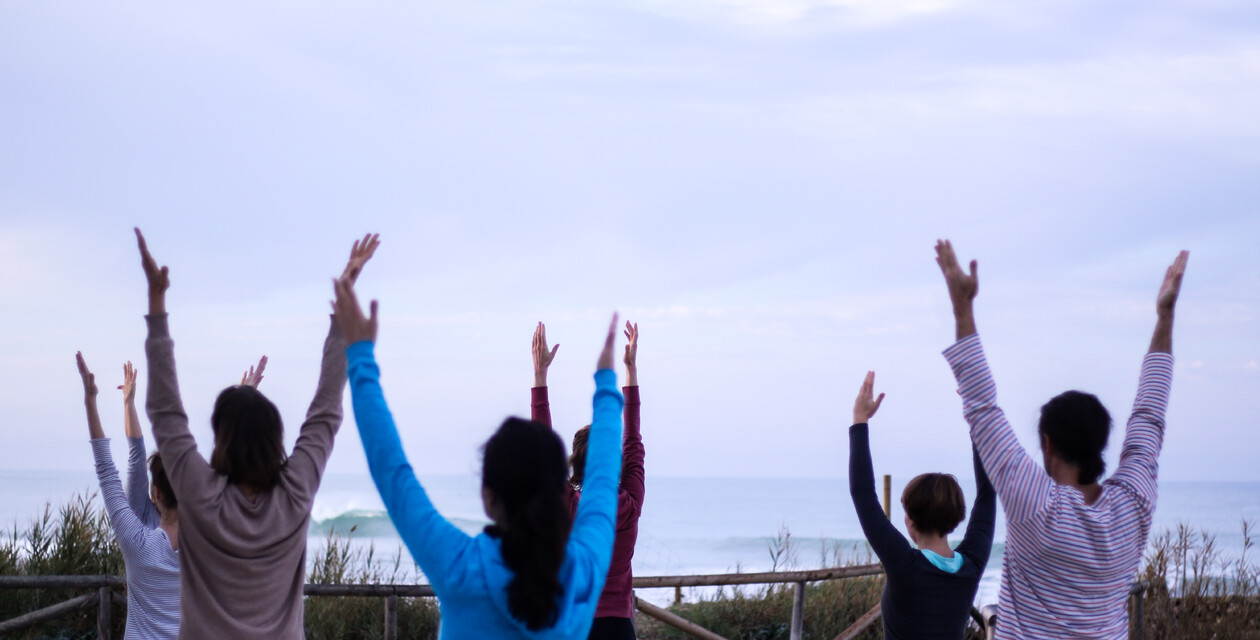
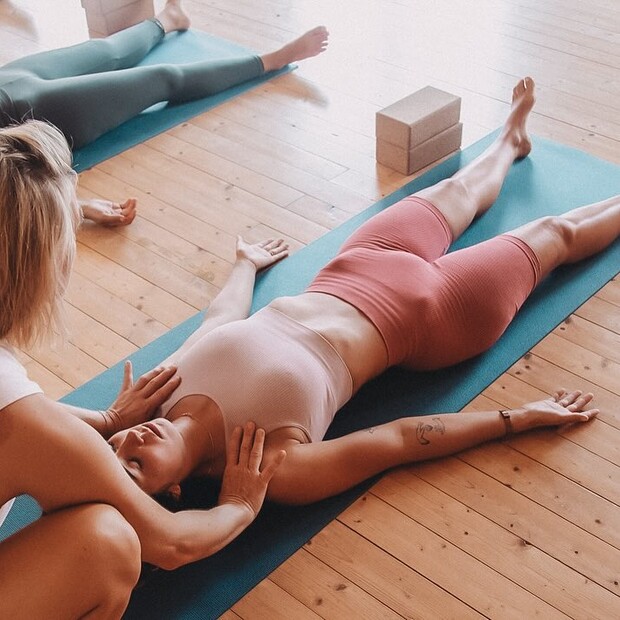
Yoga at A-Frame Surfcamp & Yoga Retreats
Would you like to combine surfing and yoga? At our camp, you can spontaneously attend a yoga class after surfing. Or you can book a surf & yoga package directly. Look forward to yoga with a sea view!
Conclusion surf vacation beginners
A surf vacation for beginners is a fantastic way to learn how to surf while enjoying the beauty of nature and the company of other surfers. With the right preparation and equipment, qualified surf lessons and an awareness of safety, you can make this adventure safe and successful. Away from surfing, there are numerous activities for relaxation and recreation to enrich your vacation. Use this time to gain new experiences, have fun and experience the freedom of the waves. Your surfing adventure is waiting for you - so pack your bags and hit the waves!
